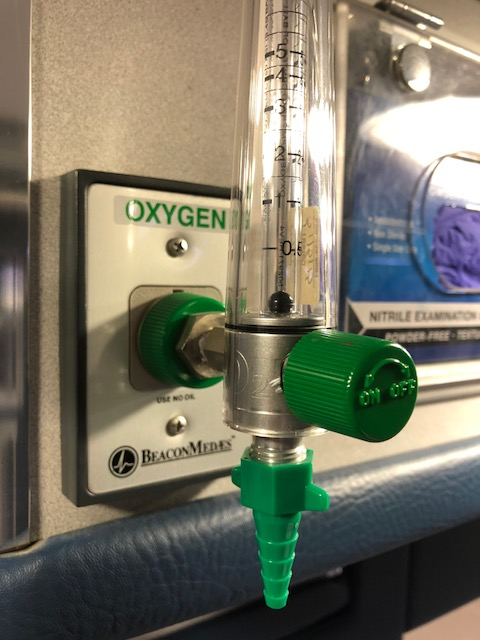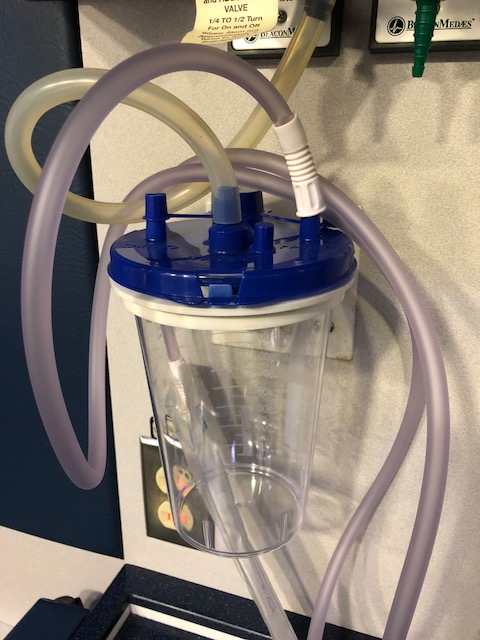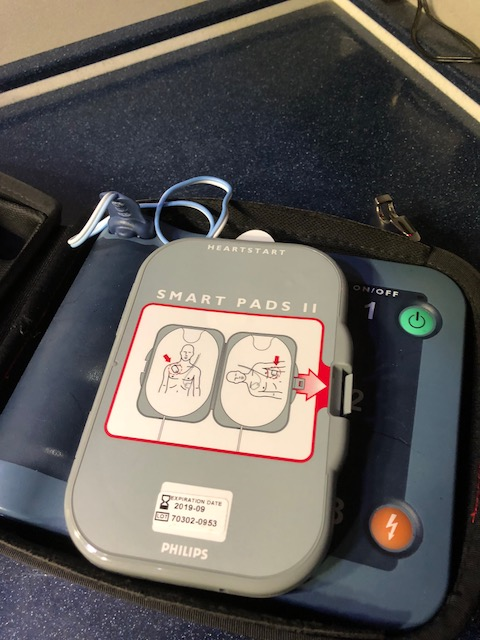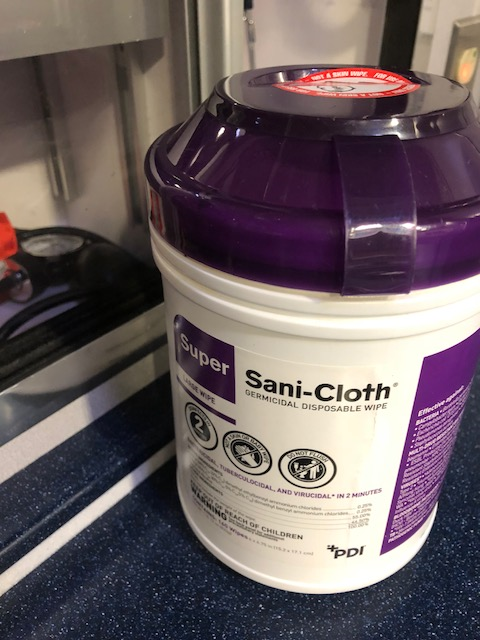Tales from an Ambulance: Episode 3 - Code
The first thing you hear is the tone. Distinct. Somber. Slicing through the chaos. The second thing you notice is the movement. It’s as if a giant magnet were turned on, attracting only the most critical staff to the source of the alert. They stop whatever they were doing and hurry purposefully toward the emergency.
A code in a hospital means that a patient’s heart has stopped beating. Medically speaking, it is the worst thing that can possibly happen to you, so they have a special process in place for if it does. Once someone reports that a patient has flatlined, a tone goes out over the intercom followed by a room number. A cross section of the entire field of medicine converges on that room in the span of a few seconds.
Halfway through my first training shift in the Emergency Room, I had yet to experience a code. The next time the intercom sounded that night, it was just an alert that another critical patient was inbound on an ambulance.
“Head on over there!” my mentor for the evening encouraged. “Medical room this time, it’s not a trauma.”
I’m still not gonna see anything gory. Maybe next call.
I rounded the corner to the critical corridor just in time to see the double doors burst open and a stretcher head down the hall and into one of the rooms. Gauging by the amount of medical hardware strewn across the patient’s body, I knew it was a bad call. He was getting oxygen through a CPAP machine, which helps push air into your lungs when you have difficulty breathing. Paramedics had also started an IV line to give him who knows what kinds of drugs to help him fight whatever was ravaging his body.

As they transferred the patient from the stretcher to the bed in the room, I took a position in the hallway. I could see directly through the large window and took in everything that was happening. No fewer than six medical personnel were inside the small hospital room, and each was buzzing about their respective tasks. The respiratory therapist was changing the CPAP out for a BiPAP machine to further assist in his breathing. The tech was getting a fresh set of vital signs. The paramedic was adding a new drug to the intravenous line. It was like watching a colony of bees crawling all over a hive.
This is crazy. They don’t even know what’s wrong with him yet.
The EMT who had driven the man to the hospital wearily exited the room, his job done. He turned and stood right next to me, and we both watched the controlled chaos unfold in silence for a minute.
“So what happened?” I asked him.
He sucked in a deep breath and let it out slowly through puffed cheeks. “Family panicked when he started having difficulty breathing. By the time we got there he couldn’t even communicate with us. We hauled him in as quickly as we could. Apparently he has cancer and it took a turn for the worse.” He was visibly shaken from the call, and I could tell that he still had adrenaline coursing through his veins. He was in no hurry to collect his stretcher and depart. He felt a desire to see this through, or to at least stay for a while longer.
Heck of a call. It’ll be my turn one day. I hope I manage to bring the patient in alive like this guy was able to do.
The doors to the hallway burst open again and a small gaggle of adults came pouring in, dressed in civilian clothes and in various states of hysteria.
Oh gosh, who let the family in here?
One woman, whom I presume was the patient’s daughter, continued down the hall and through the door to her father’s side. She grasped his hand as tears streamed down her face. I felt a lump well up in my own throat.
The social worker assigned to the case caught up with the family and began to explain the next steps. I tuned her out to watch the drama which continued to play out in the room.

From my vantage point, I could see everything. It was like having a front row seat to the filming of a medical drama. The patient was an older gentleman, with wispy hair. His eyes were opened wide, and his chest heaved with every breath he took. His body twisted and flexed with exertion. Sweat was pouring down his face. He was staring at the ceiling, focusing intently on something. Or perhaps he was delirious and he wasn’t focused on anything at all. It was impossible to tell.
His daughter continued to grip his hand and kneel by his side. The medical staff worked around her. As they completed their various tasks, the room started to gradually empty. When the doctor emerged to speak with the family, the patient was hooked up to all the devices necessary at this stage and was simply being monitored as the machines assisted his breathing.
The doctor approach the family and spoke to the wife.
“I believe your husband is in septic shock.”
“But he was just fine this morning! He ate breakfast and was walking around!”
“I understand, ma’am. Once sepsis takes over, it can move very quickly. In his condition, I think we need to discuss the probability that he may not recover from this.” The statement hung in the air for a moment. The wife was expressionless. The other adult children looked solemn. “Do you know if he wanted medical intervention to keep him alive?”
“What? We never talked about that. I mean, for his surgery last year he didn’t want it, but now, I’m not sure.” The wife was searching for answers that weren’t there. She looked over at her husband. “What could you do for him?”
“Well,” the doctor explained, “we can sedate him and intubate him and let a machine take over his breathing. That’ll help relieve the distress he’s in right now and make him comfortable.” Even with the BiPAP device assisting him, I could see the patient continuing to struggle with each breath. His eyes were still transfixed on that same spot on the ceiling. He was oblivious to everything around him.
“We can also continue treating the sepsis with antibiotics, but with his cancer as advanced as it is, I don’t have much hope that he can beat it. I am honest with my families and I’ll be honest with you: he only has a day or two left to live at the very most.”
The wife brought her hand to her mouth and for the first time I could see a tear fall from her eye. She stood in silence for another minute and stared through the window, watching her husband fighting the ultimate battle for his own life. She had no idea what to do. The decisions was hers alone to make, and she was woefully unprepared to make it.
I shouldn’t be here for this. This is a private moment.
“I think,” she finally said, “that he would want his children to be able to say goodbye. The oldest daughter is still a couple hours away. You can do whatever you need to do to at least let her say goodbye.”
“Alright, understood ma’am,” the doctor said. “Mrs. Sanchez will take you to a place where you can wait,” he concluded, referring to the social worker.
As the family departed, the daughter in the room stroked her father’s head and said goodbye. The lump in my throat rose up a third time and I felt the sting of tears in my eyes. I turned away and watched a nurse move a blood sample from one cart to another. When I turned back, the family was gone. The doctor was back in the room with the patient.
The team was now attempting to place a larger IV line directly into the patient’s neck. This allows for a far greater volume of liquid to flow much more directly to the patient’s heart and brain, and it is called a “central line.” Despite his condition, the patient was still conscious enough to resist the procedure. He kept reaching up to defend his neck, stymieing the resident attempting to place the catheter.
“Doctor, patient is resisting,” the resident said.
“Start him on 50 mg of propofol,” the doctor said, referring to an aesthetic that would knock the patient out.
A nurse quickly retrieved the prescribed medication and injected it into the existing IV line. Within seconds, the man’s arms started to go limp. Shortly thereafter, his breathing relaxed and the muscles in his face slackened. The respiratory team quickly sprang to action and began the process of sticking a breathing tube directly down his trachea. By the time they had finished, he was completely unconscious. His heart rate had also slowed, from a rapid staccato on the monitor to the calmer beat of normalcy. I saw the numbers for his blood pressure update. They too had plunged.
Night and day difference all from a tiny vial.

As the majority of the team cleared out of the room, I cautiously entered and stood exactly where the daughter had been. A surgical covering was laid across his body and the resident was about to attempt the central line again. The tiny television in the room was on, and I could finally hear its speaker. Donald Trump was giving a speech. The only other sound in the room was the breathing machine, laboring away at its task. A secondary tube discharged a thick brown mucus into a collection chamber once every few seconds, making a sucking sound as it worked.
What a way to go out.
“Mind if I watch?” I asked the doctor in training.
“Be my guest.”
I observed the procedure, done with a much larger needle than any that goes into your arm. When they were finished, they had a brand new access point that led directly to the man’s heart. They taped over the incision with a clear bandage and left the room as well. I followed them out, leaving a lone nurse doing paperwork to observe the patient resting.
Wow. Time to take a breather.
I wandered back to find my tech. I followed her around for the next hour.
A new room, a new patient.
This is a big guy. He barely fits on the bed.
I caught the last half of the patient interview as the nurse was trying to figure out what was wrong.
“… didn’t eat anything since last night. All I’ve had to drink today was coffee. And my stomach is killing me!” he finished.
“Mhm, and what else did you do this morning?” the nurse asked.
“I was with my woman, and we were…” he paused, searching for the right word. “Together,” he finally said, placing extra emphasis on the word to imply the deeper meaning.
“I see, and did you pull a muscle while you were being intimate?”
“No, she was on top,” he stated matter-of-factly. I glanced in the corner of the room where a woman stood silently.
Is that her? I can’t decide what would make this more awkward: yes or no.
A different doctor entered the room shortly afterwards. She was an Indian woman and spoke with a distinct accent.
“Mr. Hammond, and how are you doing this day?”
“I’m in pain, doc. My stomach is killing me.”
The doctor reviewed the chart and began her own redundant questions. Sometimes I pity the patients for having to repeat the same information twenty times over. When they got to the part about the events leading up to the pain, Mr. Hammond described it the same way he had with the nurse.
“Yes, yes, you were with your friend, and what were you doing?”
An awkward silence hung in the room. I tried to suppress a smirk. The nurse turned around and went back to typing to hide her own amusement.
“We were making love,” he tried to clarify.
“I’m sorry?” The doctor still didn’t understand.
The patient looked exasperated. “Sex! We had sex.”
“I see,” said the doctor, nodding gravely. When I left the room, the team was no closer to a plan of action than before, but at least I had had a good chuckle.

I was standing with my tech again at her shared workstation in the hallway when the intercom crackled to life once more. Only this time, there were no words; there was just a tone.
“Code!” she said to me animatedly. “Get down there! Same room as before!”
The old man from earlier!
I hurried down to the critical rooms and saw I had been beaten there by about a dozen people. The room was stuffed with staff, and a few were spilling out into the hallway.
Amidst the cacophony of shouts and activity I heard a voice. “The student! Where’s the student!?”
One of the techs that was standing out in the hallway saw me approach and called out, “he’s coming!”
“Get him in here!”
Me?! What on Earth do they want me for?
As I passed the windows, it clicked. The paramedic who had called for me was performing CPR on the patient. His body shook with each compression. She looked directly at me and jerked her head over her shoulder in the universal sign for “get over here now.”
Before I even had time to process what was happening, I had swapped places with her. I looked down at where her hands had been and folded my own on top of each other and laid them on his chest. Without hesitating I began my own set of compressions.
A human body is not a water balloon. But it’s not a hard shell, either. It’s complex mix of bone, organs, and blood vessels that a practice dummy just doesn’t come close to simulating. Pressing down on that man's chest, I felt organs move and bones flexing.
It’s not as difficult to do this as I had thought it would be. Maybe she already broke his sternum. That would explain the sharp edge I feel in there.
Just a couple dozen compressions into it, and the doctor told me to stop. I stood up fully on the stool I had been using and towered a full foot above the rest of the room’s occupants.

He grabbed an ultrasound wand and pressed it to the man’s chest. All eyes turned to look at the monitor. On it, a grainy image of the heart appeared. Muscles were quivering, and you could see the periodic flex of an attempted beat. He removed the wand.
“Start compressions again!” the paramedic snapped.
I leaned over again and started pressing down on the man’s chest once again.
“Stop compressions!” the doctor barked.
Make up your mind, people!
I stood up, and the doctor pressed the ultrasound wand against the man’s skin once more. The image on the screen held much less activity this time. The tissue was dying, but it wasn’t dead yet. The doctor removed the wand.
“Call it,” the doctor said. “Time of death,” he looked at the clock on the wall. “8:48.” He stripped off his gloves, dropped them on the floor, and walked out of the room.
That’s it!? That’s death?
I was still standing on the stool and now suddenly found myself useless and in the way. The room was quiet. The TV droned on softly with a commercial for soap. A nurse turned it off and everything fell silent except for the sound of the breathing machine, continuing to push air into a pair of lungs. Someone finally shut it down, too.
I stepped to the floor and looked around for something to do. For some reason, I didn’t want to leave. I looked at my feet. Strewn across the floor was a tremendous amount of medical trash: bandages, wrappers, plastic caps to needles, a sheet. I helped the tech clean it all up.

The room emptied almost as quickly as it had filled, and the clean-up did not take long. The tubes were removed from his mouth. The central line was pulled out and bandaged over. Fresh sheets were brought in and neatly drawn up to his shoulders. He appeared peacefully asleep. The tech paused by his side before she left the room.
“Rest in peace, Mr. Moffat,” she said softly as she gently stroked his hair.
The lump came back a fourth time.
I was the last one to leave the room. When I rejoined my tech, she asked me what had happened.
“He died,” I said flatly.
“Oh, no! That’s too bad. Did you give CPR?”
“Yeah, just a little.” We chatted a bit more about the other details of the code.
“The thing that strikes me,” I said, “is how gray the line is between life and death. It just seemed so… arbitrary.”
“Yeah it’s pretty mysterious,” she offered.
I finished the rest of that shift and went back to my car. During the drive home I reflected on the incredible evening I had just experienced. I was newly thankful for the good health I and my family enjoyed. I was impressed at how I handled things during the shift. I marveled that I was not overly emotional about anything that had happened, even in the privacy of my car. I wondered if his last child ever made it to say goodbye. But most of all, I thought about Mr. Moffat, his final hours, and how the divide between life and death is barely a divide at all.

@DollarsAndSense is a father, veteran, participant in the rat race, freelance writer, and volunteer EMT. Want to read more of my EMT posts?
- Tales from an Ambulance: Episode 2 - E.R.
- Tales from an Ambulance: Episode 1 - D.O.A.
- A shift on the ambulance
- What it's like to be a volunteer EMT
Unless otherwise noted, all text and pictures in this post are my own and may not be reused without my permission.


Join us @steemitbloggers
Animation By @zord189, Divider By @jaynie
Congratulations! Your post has been selected as a daily Steemit truffle! It is listed on rank 17 of all contributions awarded today. You can find the TOP DAILY TRUFFLE PICKS HERE.
I upvoted your contribution because to my mind your post is at least 6 SBD worth and should receive 216 votes. It's now up to the lovely Steemit community to make this come true.
I am
TrufflePig, an Artificial Intelligence Bot that helps minnows and content curators using Machine Learning. If you are curious how I select content, you can find an explanation here!Have a nice day and sincerely yours,

TrufflePigThanks, TrufflePig!
Wow man, you are an excellent writer. You really made a fast-paced intriguing read that was easy to follow even with so much going on.
Thanks man, that means a lot. Just a story I needed to tell, glad I did it justice.
Yay! This was good and it triggered my existential horror! Well done! I'll be in the fetal position if you need anything.
I'll try and post closer to your bedtime for my next one
The divide is thin indeed. The amazing thing is that we last as long as we do. Entropy is a difficult thing to stave off.
Proud member of #steemitbloggers @steemitbloggers
Well put! I think I read somewhere that even after you "die", millions of your continue their thing until they slowly start to fizzle out themselves -- a process than can take hours under the right conditions.
Congratulations @dollarsandsense! You have completed the following achievement on Steemit and have been rewarded with new badge(s) :
Click on the badge to view your Board of Honor.
If you no longer want to receive notifications, reply to this comment with the word
STOPsir dollarsandsense! wow this could be right from a tv medical drama, you had us so involved like we were there and it was quite an emotional ride! I think curie should show up for this one!
Thanks @janton! I appreciate the compliment! And that makes two of us :P
haha well from what I've seen ,..once you're on her route she keeps coming back so it is likely to happen.
Holy Moly! What an action paced and gripping read! My mother and brother work in a hospital, but they keep everything to themselves, and don't talk much about what goes on there...
Yeah, day after day of these kinds of stories... I can't imagine. I just do it part-time, so it's pretty easy to digest and process. I imagine an entire career takes its toll :(
Very well written! You guys / gals are unsung heros. I can't imagine rolling up on a scene of death. But I guess it's part of life. Be safe out there and thanks for sharing!
✌️
Thank you, sir! It's jarring - this was the first time I had been there to see an actual death. I guess everyone processes it in their own way.
Thanks for the compliment and well wishes! Glad you enjoyed :)
omg. you got my heart and attention to your story. :-0 it's like in a gre's anatomy episode. I'm feeling it!
Congratulations @dollarsandsense! You have completed the following achievement on Steemit and have been rewarded with new badge(s) :
Click on the badge to view your Board of Honor.
If you no longer want to receive notifications, reply to this comment with the word
STOP